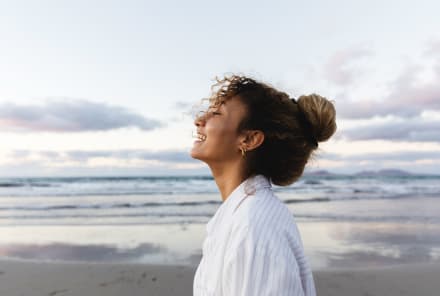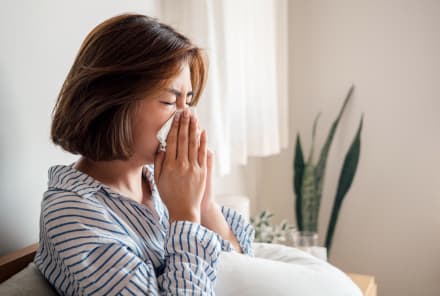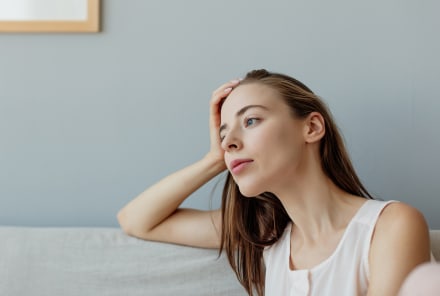Advertisement
How A Clinical Psychologist & Mom Of 2 Gets Ready For Bed Each Night


During my university years, my sleep schedule was erratic due to all-night study sessions and early morning work commitments. I would nap and replenish after intense periods, so I thought there were relatively few consequences for wrecking my sleep cycle. Looking back through my lens as a clinical psychologist, I can now see that the low mood and anxiety I experienced during those periods resulted from my problematic sleep habits, impacting my sleep further.
During this time, I would lay in bed, watching the clock tick over to 3:36 a.m., calculating that I would get three hours and 24 minutes of sleep if only I could fall asleep now. My anxiety understandably increased under this pressure, and my hyper-aroused nervous system prevented me from relaxing enough to sleep. The next night would be the same. I had broken the psychophysiological association between being in my bed and sleeping.
Upon graduation, I found a more balanced rhythm with my sleep. I cherished the luxury of going to bed early with a book at 9 p.m. and starting my day with yoga at 5:30 a.m. However, this changed when I became a parent. I was asked to accept that my sleep routine was no longer entirely within my control.
Fortunately, I've found strategies that help me navigate this season's ever-changing landscape and buffer against sleeplessness. I'm choosing to parent responsively through the night and allowing myself some quiet space in the evening to explore areas I find enriching. My routine isn't perfect. However, it's helped me free myself up from feeling anxious about feeling anxious or stressed about feeling stressed. Instead, I'm focusing on setting up the best conditions I can for a restful night ahead.
As I continuously cultivate my willingness to adapt, I find moments of harmony amid the ebb and flow of life's demands.

- Average hours I sleep a night: 7-8
- Ideal bedtime: 10 p.m., but it's often a little later
- Ideal wake-up time: Anytime when I wake up naturally… I just don't know when that is anymore! I'm woken up by my little ones between 5:30 and 6 a.m. these days.
- Nightstand essentials: Reading light, heartwarming book, journal and pen, and an earplug (singular, as I leave my "door-side" ear open to hear if my little ones wake, and plug the other ear to tone down the sound of my sleeping partner).
- Favorite place I've ever slept: I did a few outdoor sleeps in the Rocky Mountains growing up, with a cozy sleeping bag under the stars. I woke up surrounded by frost and feeling totally alive.
- Sleep bad habit: I'll stay up late writing or working on a project (it's actually the case as I write these words). Although I try to give myself some grace in context. I finish working earlier most days to have afternoon family time, so the evenings offer this sacred space for myself. A trade-off, I suppose.
- Caffeine consumption: I've played around with my caffeine consumption a lot, and now I'll drink 3-4 cups of black coffee a day. I stop drinking them by 4 p.m., as I've found that drinking any later makes it harder for me to fall asleep at night. While coffee is a stimulant, I’ve found it calms me. Interestingly, I grew up in a household where my parents and grandparents would comfortably drink coffee through the evening, never reporting any sleep effects. Knowing how many clients report incredible decreases in their levels of anxiety when they limit their coffee consumption, this is a reminder that our own neurophysiology is important to consider in our sleep practices.
- How I track my sleep: I don't track my sleep. At this point in my life (with little kids still waking up), I wouldn't have much capacity to use the data to make any big shifts. So, rather than worrying about something I can’t control, I'm working on focusing on the elements I can.
- The last product that changed my sleep for the better: I love my Shaktiacupressure mat. I will use it before bed if I am overstimulated, or even pull it out if I am experiencing difficulty falling asleep and need to interrupt the cycle I'm in.
- The first thing I do when I wake up: This shifts if I wake up before my kids, but generally they are up first. I get them each a glass of oat milk, as I’ve found getting something in the bellies right away means we don’t have as many tears before breakfast is ready.

Daytime Prep: Key factors in my day impact my experience when I go to lay my head down on my pillow at night. Specifically, morning sunlight and how much I move my body. Today is a therapeutic consulting day, so I'll be sitting inside for most of the day. With this in mind, I start the day standing barefoot in my backyard, slowly sipping an espresso while my kids bounce on the trampoline. (The first sunlight that hits our eyes is a cue for our circadian rhythm and promotes sleep in the evening, even if it is cloudy.) To ensure I get some exercise in, I pack my consulting clothes into my backpack and ride my bike to my clinic. If I had been planning to drive, I would be trying to schedule a yoga class or taking a brisk walk at lunch.
7 p.m.: My bedtime routine starts so early because it is integrated with getting my children to sleep. I'll spare you the long-winded details of my child-wrangling…which, despite feeling uphill, will eventually lead to sleep.
7:40 p.m.: I am lying in bed with my two sleeping darlings. In fact, it is at this time that I offer myself a relaxing moment of heartfelt meditation on them as they sleep. I listen to their rhythmic breathing and soak up their little faces. It's a nourishing pause before I crawl out into my own nighttime routine.
7:45 p.m.: The kettle is boiling, and I'm making a cup of loose-leaf herbal tea. This feels like a brewing bookend, a ritual to contrast opening my day with freshly ground coffee.
8:07 p.m.: I join my partner in the office. As he finishes up some of his remaining tasks, I work on developing a group therapy program I'm offering later in the year. While I sometimes question the balance of working in the evening, this is my happy place, integrating psychology and yoga. However tonight I put an alarm on because I also have a full clinic tomorrow and my nervous system is still feeling weird from today. I know if I don't put in steps to get to sleep, I'll likely suffer emotionally tomorrow.
9:15 p.m.: The sound of a bell chimes (I like a gentle alarm) and I write out a couple of sentences to remind myself where I left off tonight.
9:17 p.m.: In the lounge room, I pull out my phone to turn on Audible. I set the timer for 15 minutes on my current read, No Bad Parts by Dr. Richard Schwartz. I roll out my Shakti acupressure mat for a solid sensory release. This isn’t something I do every night, but if I have been feeling overwhelmed it is really helpful in decreasing the likelihood I'll end up lying exhausted, yet sleepless, in bed.
9:37 p.m.: Showers are my favorite, and I head off for mine. Nearly every night I have one. The warmth of the shower (or bath) means that when you come back out to room temperature, your body temperature drops. This is a physiological sleep cue, a way to remind your system to take you off to Never Never Land. But more than this, there is something symbolic in the ritual for me, a sense I can let the weight of the day flow down the drain. (Don't worry, it's a slow-flow showerhead…because I brush my teeth and wash my face in here too!)
9:55 p.m.: Turning on my bedside table lamp, I set down a glass of water and pick up my journal. Crawling into my covers, I open my journal to reflect on my day and anything else that I need space for. This is a practice that has carried me through some very tricky times, as I find the process of writing down often means my mind finds it easier to let go of. However, I have only recently returned to consistent journaling and reading because I have only recently not had a little person sleeping in my bed. A nice reminder that we can shift our rituals with our seasons. (Perhaps I'll write this reflection in my journal!)
10 p.m.: "Hey Siri, set an alarm for 6:30 a.m." I switch on airplane mode and set it down on my bedside table. If I wasn't consulting tomorrow, I would have left my phone in the office, but it's here on a wildly hopeful chance that I won't wake to the pitter-patter of little feet racing down the hall before my alarm. I do have a sunrise alarm clock in my bedroom…. But it is another practice that saw its way to hibernation in this season of early awakenings.
10:02 p.m.: Picking up The Forty Rules of Love by Elif Shafak from my bedside table, I sink further into my covers. I love reading fiction in the evenings. Entering an alternate world takes me away from any sticky thoughts my mind might have been drawn to, while shifting my consciousness feels conducive to the wave of sleepiness I'll be drifting to. This book is particularly delightful because it is spiritual nourishment woven in a love story.
10:20 p.m.: With tired eyes, I bookmark, though I've been known to read well into the night. (Maybe I need another alarm here too.) I turn out the light and put in my partner-side earplug. I sleep lightly, and breathing is bothersome for me. I also want to make sure I can hear if anyone does need me at night, so this is the best solution I've got right now.
1:20 a.m.: "Maaaaaaama. Maaammma." Ugh, I resist leaving the comfort of my warm bed. In these moments, I find it valuable to acknowledge my resistance. I have to consciously embrace a sense of willingness as I pull back the covers and go find out what she needs. Of course, just because I'm willing doesn't mean I enjoy it. Fortunately, it turns out to be a brief midnight(ish) bathroom break.
1:27 a.m.: Curled into my own bed, I return to the land of nod.
5:55 a.m.: With the sound of pitter-patter, two little shadows appear in the doorway. The "both/and" experiences of my day start early: I would rather still be asleep, and I love how excited they are to come say good morning.


















